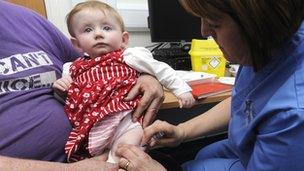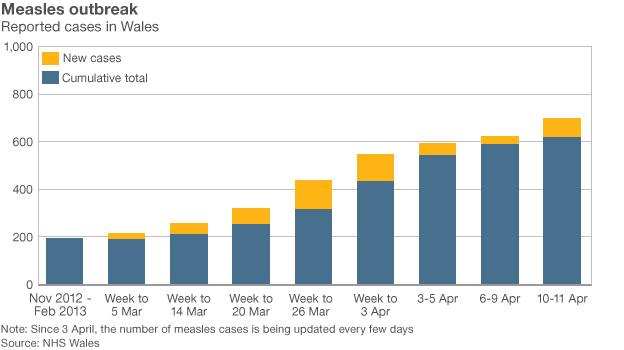Measles: Swansea newspaper not to blame, ex-editor claims
- Published

Special clinics have been held to try to get as many children as possible vaccinated against measles
The measles epidemic in Swansea cannot be blamed on a local newspaper's coverage of concerns about the MMR jab in the 1990s, its former editor claims.
The South Wales Evening Post reported on worries parents had following a now discredited report which linked the vaccine to autism.
Many experts blamed the research and media coverage of it for a drop in vaccinations resulting in an outbreak.
But George Edwards said the paper never told parents not to get the jab.
Nearly 700 people have been diagnosed with measles since the outbreak started in November, mainly affecting the Swansea area.
Health experts have said the epidemic is a result of a 10 to 15 year "legacy" of concern about the MMR (measles mumps rubella) jab.
It followed research by Dr Andrew Wakefield in the late 1990s which linked the vaccine with autism and bowel disease.
His report, which was published in The Lancet medical journal, was later discredited, with health officials insisting the vaccine was completely safe.
Dr Marion Lyons, director of health protection at Public Health Wales (PHW), said at one stage, 45% of children in the Swansea area had not been vaccinated against measles.
That figure had since fallen to 10-15% but it is still considered too low to stop the spread of the highly infectious disease.
But Mr Edwards, who was editor of the Evening Post at the time of the MMR scare, said the newspaper was not responsible for the low uptake of the vaccine.
"As I saw it, their [the readers] concerns were totally genuine," he told BBC current affairs series The Wales Report.

The Evening Post never told parents not to give the MMR jab to children, Mr Edwards said
"What were we supposed to do? Tell them to go away?
"That isn't what newspapers do. Newspapers listen to their readers, report what they say, and then they go to the relevant people and say 'what have you got to say about this?'
"And then they publish that response."
He added: "It's impossible to have regrets. I'm certain that if we wound the clock back and started again, I can't imagine any reason why we wouldn't do it the same way.
"What I do need to emphasise is that at no time did the newspaper ever say to parents 'do not let your children have this jab.' We never, ever said that."
Death 'inevitable'
Although the epidemic is centred around Swansea, cases continue to be reported across Wales.
Most are in the Abertawe Bro Morgannwg health region, which also includes Neath, Port Talbot and Bridgend.
There are also cases in Powys and in the Hywel Dda Health Board area, which covers Carmarthenshire, Ceredigion and Pembrokeshire.
Concerns have been raised that the outbreak could spread significantly across Wales.
Dr Lyons told The Wales Report that about 70,000 children across Wales have not had both the necessary MMR jabs.
"Across Wales, if you're looking at children who should've had at least one jab - children aged between two and 18 - there's 40,000.
"If you were to look at children aged between five and 18 who should have had two doses, it's another 30,000 so that's about 70,000 children who haven't had the dose."
She said she was concerned that children would be at increased risk when they return to school this week following the Easter holiday.
Dr Lyons also warned that a death was inevitable if parents did not take action to vaccinate children against the measles epidemic.
She told the programme: "There were six deaths in France in 2011 and five of those were teenagers. If we don't vaccinate our children, it will happen."
PHW has said it is particularly concerned about the uptake of the MMR jab among children aged between 10 and 17, who would have been babies during the vaccination scare.
As a result, secondary schools in Swansea and Neath Port Talbot will be holding vaccination sessions this week.
Around 2,500 people also turned up at special drop-in vaccination clinics that were held at hospitals across south Wales on Saturday.
Typical symptoms of measles include fever, cough, conjunctivitis and a rash. Complications are quite common even in healthy people, and about 20% of reported measles cases experience one or more complication.
These can include ear infections, vomiting and diarrhoea, pneumonia, meningitis and serious eye disorders.

- Published14 April 2013
- Published13 April 2013
- Published12 April 2013
- Published11 April 2013
- Published10 April 2013
- Published9 April 2013
- Published4 April 2013
- Published6 April 2013